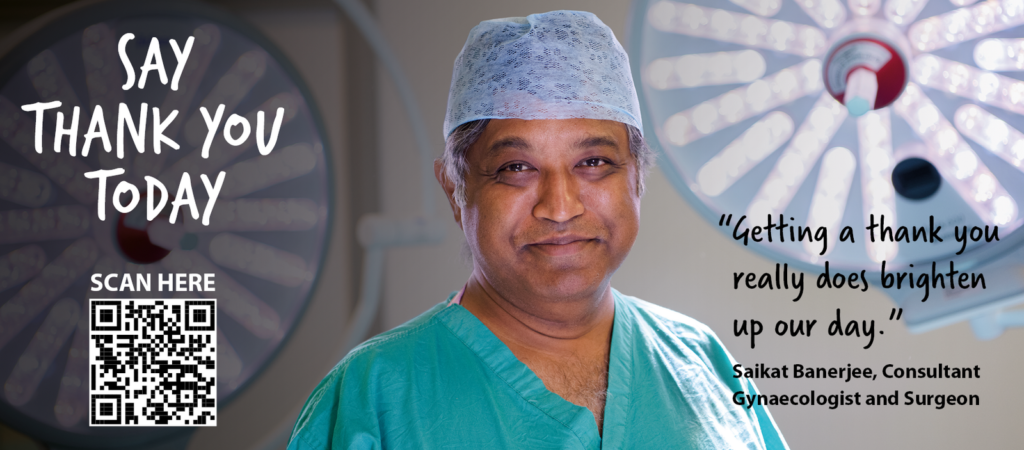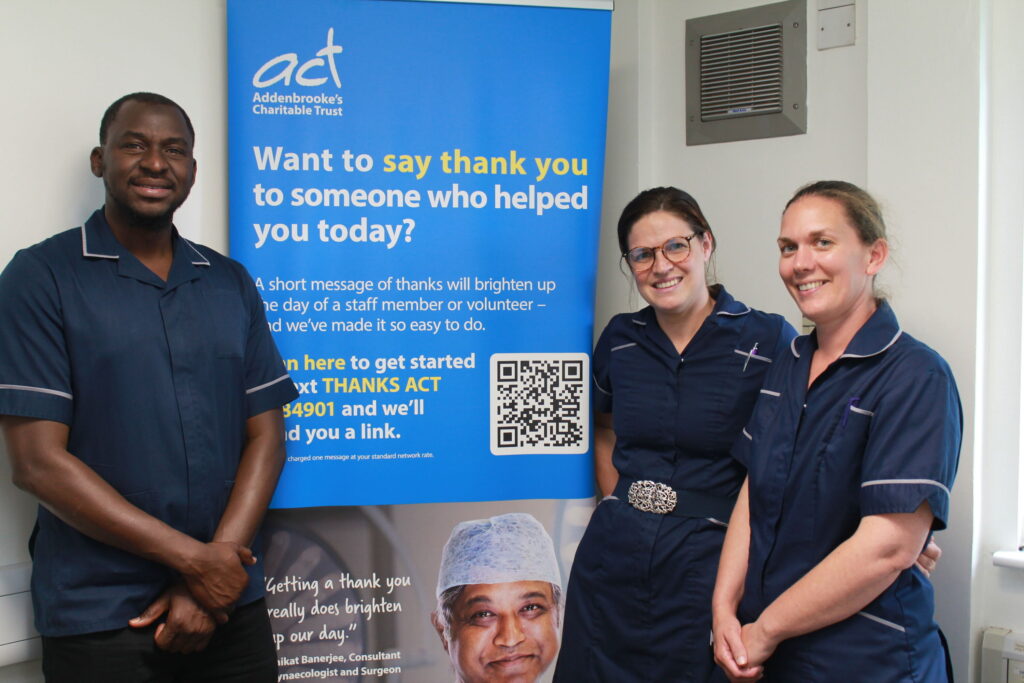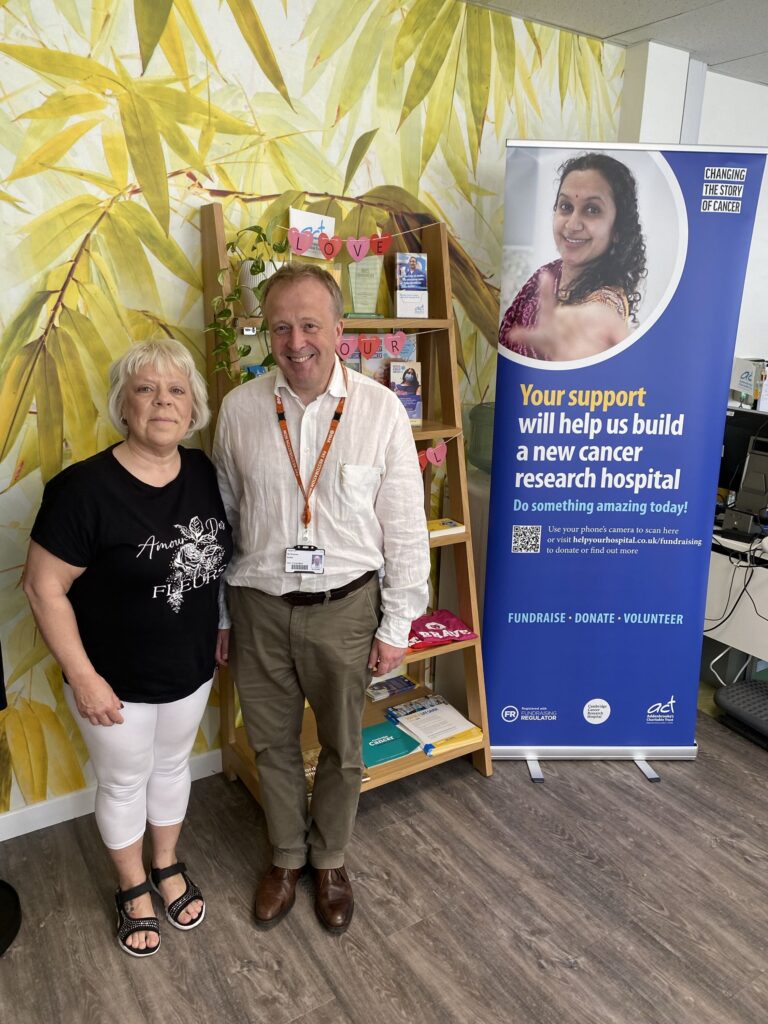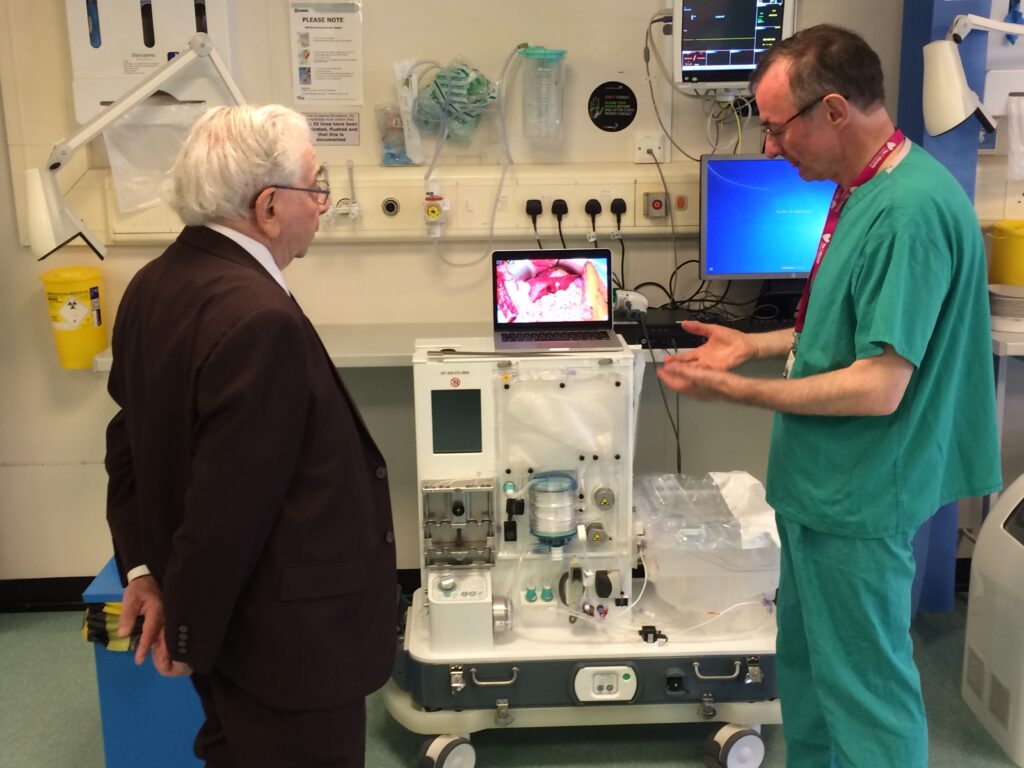A new campaign allowing Addenbrooke’s patients to send messages of thanks direct to NHS staff who care for them has been launched as part of an eight-week trial.
The ‘My Thank You’ campaign is the first of its kind in the East of England and, for the first time ever, allows grateful patients, as well as family and friends to send messages of thanks directly to a member of staff who has made a real difference to their stay in the hospital by providing them with exceptional care and support. This could be anyone from a member of the security team to porters, administrators and clinical teams including nursing staff and surgeons.

Messages of thanks can be left for a particular member, or members of staff, who have helped deliver exceptional care and support for patients by simply scanning a QR code displayed on My Thank You posters which have been distributed across the Addenbrooke’s and Rosie sites, both part of the Cambridge University Hospitals NHS Foundation Trust.
Alternatively, patients can text the words THANKS ACT to 84901.
Patients complete an online form where they can enter their message of thanks together with the area or speciality it relates to, along with the member of staff’s name, if they can recall it.
Once the form is complete, patients are then asked if they would be happy to spread the word on their social media accounts to encourage friends and family to send their own messages of thanks. They will also be given the option of connecting to the hospital charity if they choose.
Addenbrooke’s Charitable Trust (ACT) launched the My Thank You campaign in early August. As the official charity for Addenbrooke’s and the Rosie, its supporters raise funds to help make the hospitals even better by funding cutting-edge research, innovations and high-tech equipment, above and beyond what the NHS is able to provide.
ACT’s Chief Executive Shelly Thake welcomed the campaign and said: “We hope My Thank You will see lots of lovely messages of thanks that we can use to brighten the day of all the wonderful staff in the hospital.”
“We know that everything our supporters do to help make our hospitals even better, is a way for them to be able to give back and say a special thank you to staff by providing funding for ground-breaking research and high-tech equipment which they know will have a huge impact on their lives. To be able to add words to their thanks now too makes it even more special.”
“Being able to give back financially is one thing but My Thank You takes this concept of patients wanting to give back one step further and allows them to send a very real, heartfelt message of thanks direct to the member, or members of staff, who cared for them during their stay.”
“Knowing that staff often go through some very personal, often traumatic situations with patients on a daily basis we believe this campaign will generate a huge response from patients and we very much look forward to seeing, and sharing, all the messages that are sent through.”
Staff welcome ‘My Thank You’ campaign

The My Thank You campaign was welcomed by the Cambridge University Hospitals NHS Foundation Trust Clinical Education Team.
Clinical Education Facilitator Waliu Jawula Salisu, said: “The campaign is a brilliant opportunity for patients and service users to express their gratitude to our hardworking staff. They invest so much emotion and energy into looking after our patients and I think this would be a brilliant opportunity to say thank you to them, which they will appreciate so much.”
Colleague Emma Le Brun added: “It’s also a fantastic opportunity for colleagues to say thank you to each other. We all work in such a busy and stressful environment, a simple thank you could make someone’s day and make them feel a lot more appreciated in a clinical environment.”
Former patients and her family welcome ‘My Thank You’ campaign
Retired carer Joyce Cripps, 77, started fundraising for Addenbrooke’s transplant services, through ACT, six years ago after her daughter Julie Halls underwent an emergency, lifesaving liver transplant after her organs failed after she contracted sepsis and pneumonia.
Julie was given just two weeks to survive without a transplant and Joyce said that after the transplant team at Addenbrooke’s saved her daughter’s life, she will never give up fundraising for Addenbrooke’s.
“As a family we are truly grateful, we always will be, to the wonderful surgical team and all the staff that really gave Julie a chance of life and for us to save her.”

For Julie, getting to meet the surgeon who saved her life was a very emotional moment – “Having the chance to say thank you to Andrew Butler in person was just amazing.” (seen here, in picture)
Both mum and daughter, from Bishop’s Stortford, say the campaign, where patients and families will have the chance to thank every member of the hospital staff team that care for them, is a fantastic idea. Both women remember different members of staff who supported them through Julie’s lifesaving operation.
Joyce said: “I can honestly say the staff in the hospital were brilliant. The day of Julie’s operation when we arrived to be told that the organ would be arriving later that day, the co-ordinator Michael Hope was absolutely amazing, the way he looked after me and Julie’s husband Paul. Julie was very distressed and very frightened at the thought of what was ahead of her so Michael put Julie’s mind at rest and asked Julie why she was frightened. She asked him if she was going to die and he said, ‘Julie, when my car breaks down, it goes into a garage that I trust and the car comes out at the end of the day all repaired and that is what we are going to do for you. That is not our goal today for you to die.”
As for Julie, she remembers lots of people from her stay at Addenbrooke’s. “I can honestly say that my stay in Addenbrooke’s was one of the best times of my life because of the wonderful staff that were so kind and caring, even down to the lady who served my breakfast. Her name was Fran and I still remember her smiley face.”

